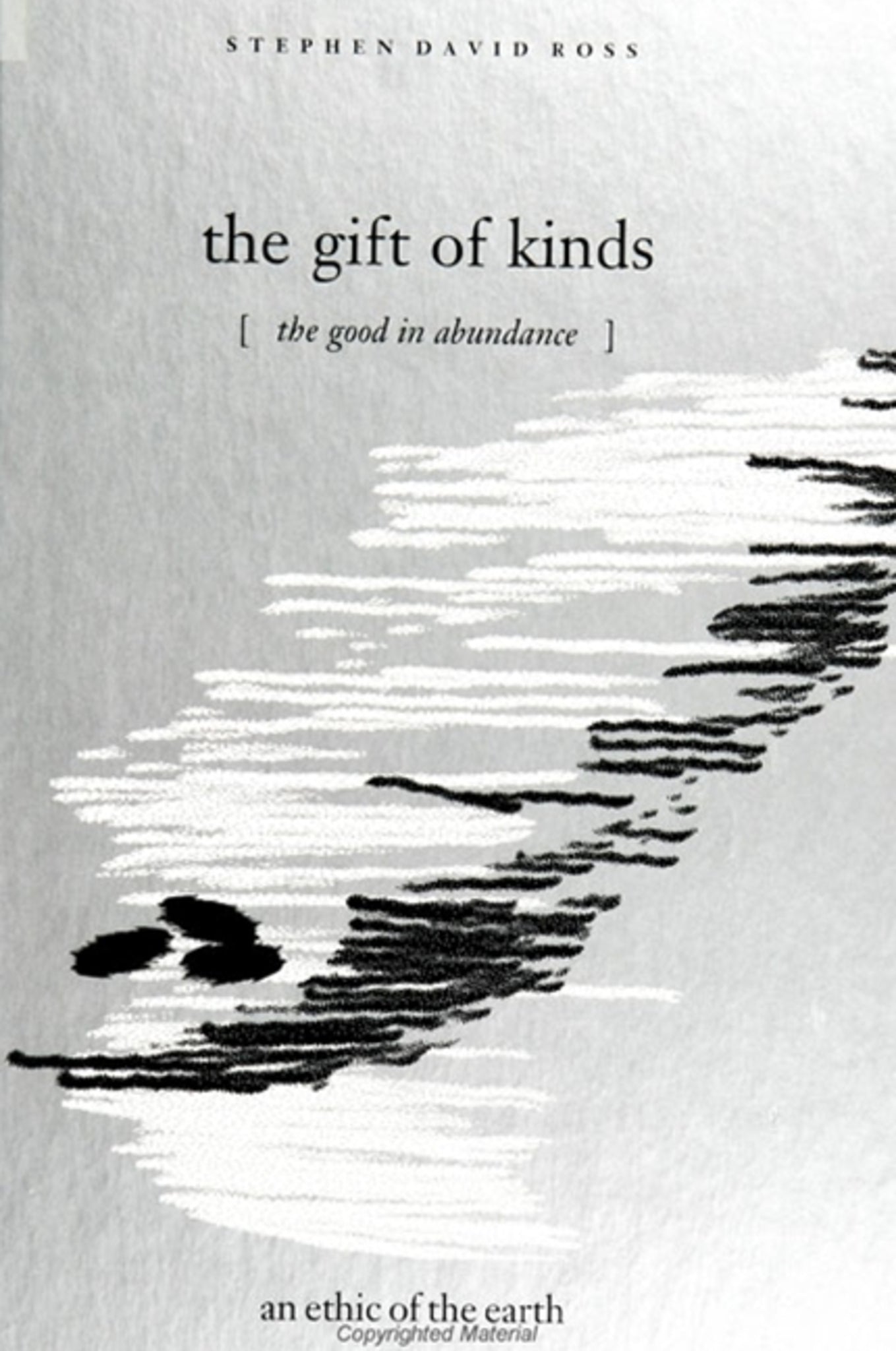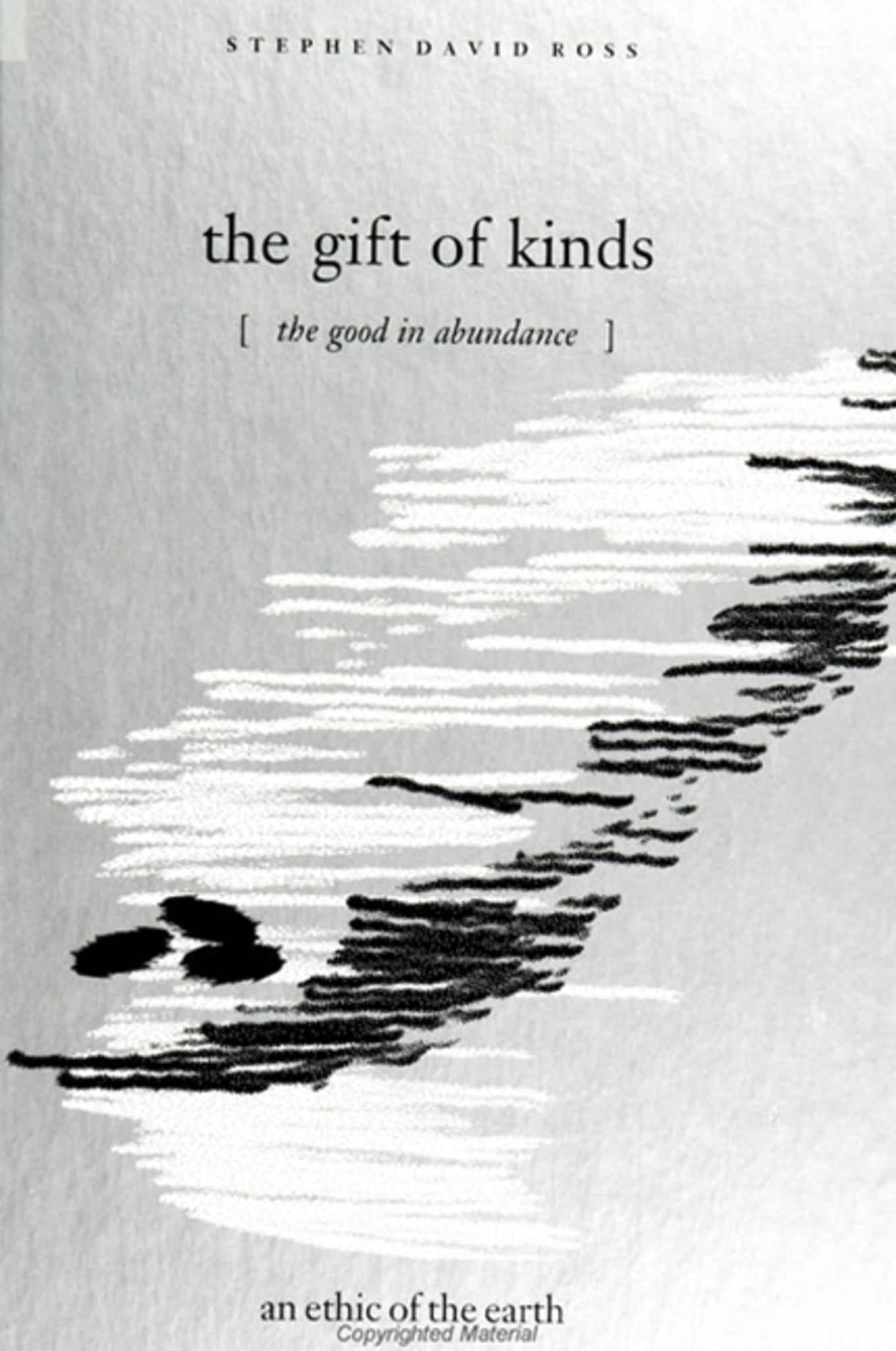We're sorry. An error has occurred
Please cancel or retry.
The Gift of Kinds

Some error occured while loading the Quick View. Please close the Quick View and try reloading the page.
Couldn't load pickup availability
- Format:
-
16 September 1999

Explores the idea of human and natural kinds, pursuing an ethics of the earth responsive to social, political, and environmental issues.
In this fourth volume of Stephen David Ross's ongoing project reexamining the Western philosophical tradition, The Gift of Kinds explores the order of things, linking the kinds of the natural world to disciplinary distinctions and to social divisions by gender, race, class, and nationality. It pursues a local and contingent ethics that pervades human life and the earth that responds to the expressiveness of things everywhere, resisting the tyranny of kinds, human and otherwise.
The book examines the idea of natural and human kinds as requisite to any thought of heterogeneity and any resistance to neutrality, developed in relation to ecological and environmental issues. The giving of the good is understood in terms of species and kinds, linked with genealogy: family, gender, race, kin, and kind. Levinas's sense of exposure–expression and proximity–is interpreted as propinquity. Kinds are interpreted as intermediary figures between histories of domination and celebrations of responsibility, between essentialism and identity politics.


"I am impressed with Ross's ability to construct an intricate framework of philosophic and literary figures and issues. The textual involvements Ross explicates and utilizes are clearer and better 'represented' in this book than in any of the previous books in the series. Professor Ross's gift is of a kind that stimulates and enlivens active philosophical inquiry." —Gayle L. Ormiston, coeditor of Transforming the Hermeneutic Context: From Nietzsche to Nancy
"Ross deals with enormously difficult questions in an accessible philosophical style (even for readers unfamiliar with the many sources he works with). The scholarship is extensive, comprehensive, and marvelously brought together in support of the project. The Gift of Kinds not only breaks fresh ground, but offers an exciting framework for reconsidering the importance of the abundance of things and the overwhelming reality that 'nature everywhere expresses.' For readers who have escaped the hold of 'intellectual analyticity,' The Gift of Kinds is a sheer delight. I find it powerful, catalytic, and exciting." —Max Oelschlaeger, editor of Postmodern Environmental Ethics
General Preface to the Project:
Gifts of the Good
The fourth of several volumes devoted to the good. Human, natural worlds filled with gifts. Nature the general economy of the good, earth's abun-dance. Resisting authority and totality. Plato's idea of the good beyond measure. Unlimiting every limit, interrupting authority. Gifts and giving. Exposure interruption, calling for responsiveness, responsibility. Cherishment exposure to the good everywhere in generosity. Sacrifice impossibility of fulfillment. Plenishment crossing cherishment and sacrifice: inexhaustible exposure to the good. Socrates' suggestion that the good grants authority to knowledge and truth. Anaximander and injustice in all things, demanding restitution. The good as ideality. Volumes projected in this project. Began with art in response to Nietzsche's interruption of authority in name of art. Continue within possibility that Western philosophic tradition has always given precedence to truth and being, neutralizing the good. This volume addresses kinds of the earth as ecstatic revelation s of life and being, resistant to neutrality.
Introduction:
The Abundance of Kinds
Spinoza and abundance of kinds. God and nature expressed in infinite numbers of infinite kinds. Nature composed of infinite individuals, each expressed through infinite kinds. Conatus, desire. Love of God, Dei amor, beatitudo, blessedness. Kind\red\ness and kind\ness. Tyranny of kinds: using other kinds in any way whatever. Interruption: essentialism and identity politics. Tyrannies of singularities and kinds. Heterogeneous differences among singulars and kinds. Good and evil. Profit and advantage. Two ethical discourses: good and evil, God and nature. Natura naturans, natura
naturata; potentia, potestas. Infinity of kinds. Levinas. Infinity of infinite. Singularity. Wittig. Exaltation and universality. Mimesis. The Lesbian Body. All human works and things given from the good, without neutrality. Cherishment, sacrifice, plenishment. Sacrificing sacrifice. In expression, the abundance of species and kinds.
Chapter 1
Woman's Kinds
Griffin. Woman and Nature. Pronouns, she, we. Gendered language. Wittig. J/e. Universal. Irigaray. Overthrow syntax. Ecological feminism. European history, burning women as witches. Gazelles, does, elephants, whales. Interruption: Wittig, The Lesbian Body. Interruption: Bataille. Nature transfigured by the curse. Victims. Abjection. In kinds. Griffin. We who are of the earth. Foucault, violence against violence. Horses, cows, mules. Nature speaking of nature to nature, nature naturing. We and nature weep. Stones.
Chapter 2
Ranking Kinds
Plato. Sophist. Kind, eidos, of many-sided sophist. Kin, family, propinquity, lineage, and blood. Eleatic stranger. Socrates a stranger. Genealogy, genos, eidos. Hunting the sophist kind. Philosophy hunting. To possess. Interruption: cherishment, sacrifice, plenishment. Foucault, descent, Herkunft. Kinds—genos, phulon, eidos. Techne *. Philebus. Indefinite dyad. Interruption: Possessing truth. Philosopher many-sided, many kinds. Method of genealogy, hunting. Binary division. Nature's kinds divided in two. God Himself; Day of Judgment. Definite dyad. Fish and mollusks. Resisting the neutrality of gathering. Molly. Hunting, possessing, coercing, selling. Purification, katharmos. Purity and impurity of kinds. Heidegger reading Aristotle. Phusis as morphe. Aristotle. Slaves, animals, and women. General and restricted economy. Mimesis and logos, linked by eide, kinds.
Chapter 3
Nature's Kinds
Leibniz. Monads, singularities and kinds. Anaxagoras. Always larger and smaller. Impurity and heterogeneity. Infinity. Monads. Entelechies. Identity of indiscernibles. Uncontainable multiplicity and variety. World of abundance. Mirrors, representations, without windows. Each bit of matter a garden full of plants, a pond full of fishes. From the good. Rule of God. Sufficient reason. Perfection. Fulgurations of divinity. Nature's mimesis.
Hegel. Universal. Kind much more than what is common. Consciousness of universal. Nietzsche. No one gives man his qualities. Man the animal. Tyranny of Man the God. Uncontainable refused to animals. In Hegel. Interruption: Quine and Goodman on natural kinds. Rule of science. Possible worlds. Leibniz. Hegel. Always more. Linked with kin and kind. Heterogeneous infinite in nature. Geography. Wandering.
Chapter 4
Ordering Kinds
Foucault. Order of Things. Idea of order. Borges's Chinese encyclopedia. Impossible to think. Language. Genealogy. Prose of the world. Univocity of being. Convenientia, aemulatio, analogy, sympathy. Signatures. Mimesis*. Plethora and poverty. Mathesis, taxonomy, genesis. Classical representation. Language, nature, wealth. Inclusion, exclusion, monstrosity. Interruption: Wilson, natural selection. Biodiversity, wilderness. Wealth, money, circulation. Value sacrifice of goods to exchange. Under the curse.
Chapter 5
Becoming Kinds
Deleuze and Guattari. Becoming a kind. Interruption: Nietzsche. Man a rope, a bridge. Spinoza. Heraclitus. Becoming neither being nor flux. Excessiveness of excess. Participation (methexis) becoming in kind. Difference and repetition. Becoming-animal. Molecular, molar. Genealogy. Becoming woman. Only certain animals and women. Becoming for men. Privilege. Minority, minoritarian. Impure kinds. Interruption: Irigaray, Wittig. Fluidity, domination. Minority experiences. Deleuze and Guattari. Territorialization, deterritorialization. Becoming-Jew. Music. Genealogy, geology, geography, geophilosophy. Geology of morals. Geography of morels. Interruption: Lyotard. Borders, propriety, abjection, geography. Geophilosophy. Levinas. Irigaray. Mimesis, expression. Against the neuter. Angels. In geophilosophy. Deleuze and Guattari. Machines. Derrida. Mimesis not only human. Nonanthropocentrism.
Chapter 6
Blood Kinds
Blood, lineage, genealogy. Genre, Geschlecht, Herkunft. Genus, kin, propinquity, kind; gender, reproduction, sexual difference. Women. Blood and reproduction. Sexual difference-men and women, family, reproduction; sexual indifference-objectivity, detachment, neutrality. Social contract,
women and animals, sacrifice and consumption. Griffin. Body vessel of death, in blood. Blood of our mother. Spilling and devouring blood. Derrida. Geschlecht. Dasein's sexuality. Heidegger's neutralization. Foucault. Genealogy. Nietzsche. Ursprung, Entstehung, Herkunft, Abkunft, Geburt: birth, origin, descent; emergence, parousia; family, stock, nation, kin, kind, propinquity, bonded by blood. Impurity of purity. Attached to bodies. Interruption: Irigaray. Genre, genre humain. Nature, neutrality, touch. Mark of gender in nature through language. Butler. Coding, citation, iterability, materiality. Derrida. Geschlecht. Gender in language. Man's hand, paws, fangs, claws. Dasein's friend never animal. Question of Heidegger. Rigor. Iterability, singularity and repetition. Examples. Immeasurability of responsibility and sacrifice. Cherishment, sacrifice, plenishment.
Chapter 7
Consuming Kinds
Eating well. Stockpiling. Impeding circulation of goods. Consumption, stockpiling, storing, owning, devouring the good. Derrida. Responsibility excessive. Affirmation. Différance, trace, iterability, ex-appropriation, not only human, well beyond humanity. Responsibility. Expression, mimesis, representation. Interruptions: Griffin. Consumption. Abjection. Blood. Interruption: Adams. Absent referent



